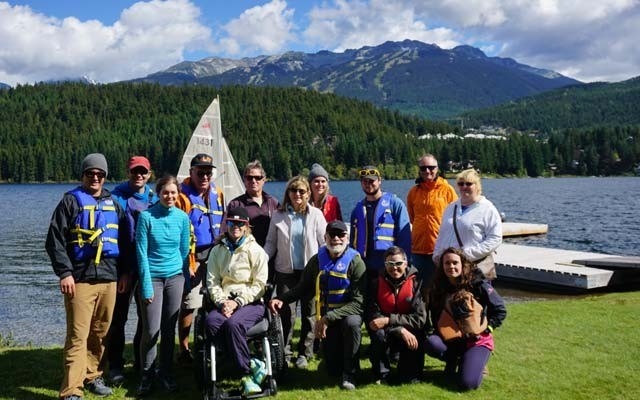Ten adaptive athletes set sail for adventure on Alta Lake over the weekend.
The Whistler Adaptive Sports Program (WASP) and Whistler Sailing Association (WSA) welcomed five athletes from the resort and five from elsewhere, including Lillooet and the Vancouver area, to hit the waters and have some fun.
Nancy Clarke's son Christopher Ham has been involved with WASP for about five years and loves being out on the water.
"This was the second year he went out on Alta Lake for the sailing clinic and it was terrific. He just loved it. Last year, the weather didn't cooperate so well but this year, (there were) beautiful blue skies, nice winds, terrific people and it was all wonderful," Clarke said.
The fun will be offered more regularly next summer after the Disabled Sailing Association of B.C. surprised the WSA with a Martin 16 sailboat. WSA head coach Francois Hebert said receiving the boat helps make things run much more smoothly.
"The main thing is this year, we got really lucky. A boat was donated to our program," he said. "The first (camp) really created some interest and showed that there is a demand for adaptive sailing in the area and then from there, it really was a huge step toward establishing the program. My goal going into this is to get the program offered as regular programming for the summer. At this point, we were a bit stuck just to do a camp each year because we have to borrow equipment and borrow a boat but now that we've got this boat, we'll be able to offer sailing for people with disabilities all year round next year."
Hebert explained the boat, valued at roughly $8,000 to $10,000, has many special features that differentiates it from the rest of the WSA fleet and allows for wheelchair users to sail safely.
"It cannot capsize. The boats that we have, the other ones, are called dinghies and they do tip. They can go upside down if you lose balance or you manoeuvre incorrectly. They're a little bit lighter and faster," he said. "And the other thing is it has aides so you can control everything from one spot. You don't have to move around on the boat. Basically, there's a chair in the boat that allows you to sit there and then right in front of you, you have (something) like a joystick... that you can use to operate the rudder.
"The lines for the sail are right in front of you so you can pull and do the different things you need to do."
Ham, a 27-year-old with spina bifida who splits his time between Whistler and New Westminster, was able to make the most of his time on the water.
"I tied knots and steered the boat," he said. "I know how to put up the sail."
Hebert noted adaptive athletes with cognitive disabilities are generally able to use the boats WSA already has.
In addition to the boat donation, the organizations received funding from the Community Foundation of Whistler to help offset the $120 cost of the camp while the Whistler Blackcomb Foundation and American Friends of Whistler helped with accessibility upgrades. That included a barge that picked up athletes at Lakeside Park and took them across the lake to the WSA.
WASP executive director Chelsey Walker said the camps have created a demand for the sport while adding organizations in Vancouver require more of a commitment from athletes upon registration. She envisions future programming in Whistler to be offered in a drop-in format so athletes can see if it's something they're interested in pursuing with greater vigour.
"We'll be able to offer adaptive sailing all summer long on a weekly basis so it's super exciting to have another permanent adaptive sport in the valley," she said. "We get a lot of people out where they want to try different sports.
"If we are able to offer a drop-in for those who live in Whistler or those visiting from the Lower Mainland or anywhere else, it's the chance to try the sport out without a longer-term commitment. One of our campers from last year loved it so much and really appreciated being able to come out for two days and trying it that he went back and signed up for the long-term program in Vancouver."
Clarke said she regularly took her son canoeing when he was younger and after connecting with WASP, he not only canoes, but kayaks and paddleboards as well.
"He's had a blast. He's been out in the fresh air. He feels healthy, empowered, invigorated. It's wonderful. He's referred to as one of the athletes, and what could be better than that for a guy in a wheelchair?" she said.




